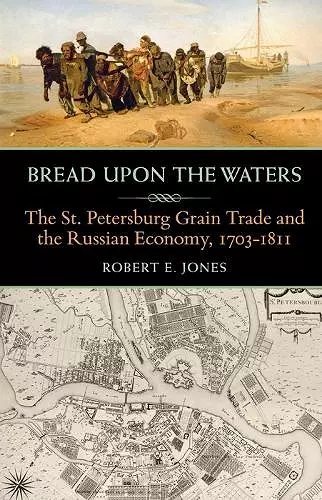Bread upon the Waters
The St. Petersburg Grain Trade and the Russian Economy, 1703-1811
Format:Paperback
Publisher:University of Pittsburgh Press
Published:24th Apr '17
Currently unavailable, our supplier has not provided us a restock date

In eighteenth-century Russia, as elsewhere in Europe, bread was a dietary staple—truly grain was the staff of economic, social, and political life. Early on Tsar Peter the Great founded St. Petersburg to export goods from Russia’s vast but remote interior and by doing so to drive Russia’s growth and prosperity. But the new city also had to be fed with grain brought over great distances from those same interior provinces. In this compelling account, Robert E. Jones chronicles how the unparalleled effort put into the building of a wide infrastructure to support the provisioning of the newly created but physically isolated city of St. Petersburg profoundly affected all of Russia’s economic life and, ultimately, the historical trajectory of the Russian Empire as a whole.
Jones details the planning, engineering, and construction of extensive canal systems that efficiently connected the new capital city to grain and other resources as far away as the Urals, the Volga, and Ukraine. He then offers fresh insights to the state’s careful promotion and management of the grain trade during the long eighteenth century. He shows how the government established public granaries to combat shortages, created credit instruments to encourage risk taking by grain merchants, and encouraged the development of capital markets and private enterprise. The result was the emergence of an increasingly important cash economy along with a reliable system of provisioning the fifth largest city in Europe, with the political benefit that St. Petersburg never suffered the food riots common elsewhere in Europe.
Thanks to this well-regulated but distinctly free-market trade arrangement, the grain-fueled economy became a wellspring for national economic growth, while also providing a substantial infrastructural foundation for a modernizing Russian state. In many ways, this account reveals the foresight of both Peter I and Catherine II and their determination to steer imperial Russia’s national economy away from statist solutions and onto a path remarkably similar to that taken by Western European countries but distinctly different than that of either their Muscovite predecessors or Soviet successors.
Provides a superb overview of eighteenth-century agriculture and trade in Russia and should be essential reading for those interested in the empire’s economic history."" - Russian Review
""As a study of internal market dynamics, Robert E. Jones's work offers new insights for anyone interested in not only economic history but also social and political history of the eighteenth century. . . . By focusing on the grain trade, Jones recovers the history of one of the largest sectors of the Russian economy and examines the equally important issue of logistics and supply within the empire."" - Slavic Review
""A far-ranging analysis of eighteenth-century Russian economic and social history. Jones shows not only how the regime toiled to feed a fast-growing but remote city but also how that essential task reflected broader state economic policy. Specialists in Russian history--and Europeanists more generally--will appreciate and value highly this original, carefully researched study of a long but unduly neglected subject."" - The Historian
""Jones' book in its theories encompasses much more than its title and core theme claim. In actuality, in the sum total of his research, the author touches upon one of the most important and profound questions of Russian history in a new era: to what extent the character and level of development of Russia and its policies allow it to be counted amongst European countries. The investigation into the supplying of bread to Petersburg leads the author to an unambiguously affirmative answer to that question."" - Cahiers du Monde Russe
""A fine study which merits a wide readership among specialists and students of Russian and European history."" - Journal for Eighteenth-Century Studies
""This book deals with the problem posed in Russia by the newly created capital city of St. Petersburg for which there was no nearby source of foodstuffs. Jones provides the best synthesis available in English of the way agriculture was organized in Russia, and explores thoroughly all aspects of the production, marketing, shipment, and consumption of grain. There is a sophisticated discussion of the various and complicated changes in systems of production and social relations during the eighteenth century. In the process, a number of stereotypical assumptions about Russia are shattered, repositioning it among European states for the eighteenth century. To my mind this work will not be surpassed by anything for many decades. It is the last word."" - George E. Munro, Virginia Commonwealth University
""This book deals with the problem posed in Russia by the newly created capital city of St. Petersburg for which there was no nearby source of foodstuffs. Jones provides the best synthesis available in English of the way agriculture was organized in Russia, and explores thoroughly all aspects of the production, marketing, shipment, and consumption of grain. There is a sophisticated discussion of the various and complicated changes in systems of production and social relations during the eighteenth century. In the process, a number of stereotypical assumptions about Russia are shattered, repositioning it among European states for the eighteenth century. To my mind this work will not be surpassed by anything for many decades. It is the last word."" - Robert Geraci, University of Virginia
ISBN: 9780822964933
Dimensions: unknown
Weight: unknown
312 pages